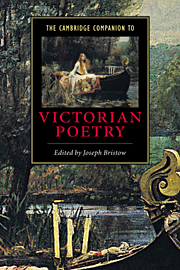Book contents
- Frontmatter
- 1 Reforming Victorian poetry: poetics after 1832
- 2 “The Lady of Shalott” and the critical fortunes of Victorian Poetry
- 3 Experimental form in Victorian poetry
- 4 The dramatic monologue
- 5 Victorian meters
- 6 Victorian poetry and historicism
- 7 Victorian poetry and science
- 8 Victorian poetry and religious diversity
- 9 The Victorian poetess
- 10 The poetry of Victorian masculinities
- 11 Aesthetic and Decadent poetry
- 12 Victorian poetry and patriotism
- 13 Voices of authority, voices of subversion: poetry in the late nineteenth century
- Glossary
- Guide to Further Reading
- Index
6 - Victorian poetry and historicism
Published online by Cambridge University Press: 28 May 2006
- Frontmatter
- 1 Reforming Victorian poetry: poetics after 1832
- 2 “The Lady of Shalott” and the critical fortunes of Victorian Poetry
- 3 Experimental form in Victorian poetry
- 4 The dramatic monologue
- 5 Victorian meters
- 6 Victorian poetry and historicism
- 7 Victorian poetry and science
- 8 Victorian poetry and religious diversity
- 9 The Victorian poetess
- 10 The poetry of Victorian masculinities
- 11 Aesthetic and Decadent poetry
- 12 Victorian poetry and patriotism
- 13 Voices of authority, voices of subversion: poetry in the late nineteenth century
- Glossary
- Guide to Further Reading
- Index
Summary
“A poet in our times is a semi-barbarian in a civilized community,” announced Thomas Love Peacock in his satirically anti-Romantic essay “The Four Ages of Poetry” (1820), an essay whose vocabulary anticipates Matthew Arnold in the 1860s but which in fact takes a position quite antithetical to that of the later apostle of Culture and Hellenism. “He lives in the days that are past,” writes Peacock. “The march of his intellect is like that of a crab, backward” (21-22). Mischievously appropriating the standard historicist idea of the four ages that originally derives from the Greek poet Hesiod (8th century BC) who charts the decline of a golden age in Works and Days. Peacock derisively consigns modern poetry to the age of brass. He claims that the poets of his own time “wallow . . . in the rubbish of departed ignorance,” parasitically weaving “disjointed relics of tradition and fragments of second hand observation” into “a modern-antique compound of frippery and barbarism, in which the puling sentimentality of the present time is grafted on the misrepresented ruggedness of the past into a heterogeneous congeries of unamalgamating manners” (19-20). Peacock exhorts the modern reader to eschew such “artificial reconstructions of a few morbid ascetics in unpoetical times” (18) in favor of the genuine item, and thus “that egregious confraternity of rhymesters, known by the name of the Lake Poets” (18) is peremptorily dismissed.
- Type
- Chapter
- Information
- The Cambridge Companion to Victorian Poetry , pp. 114 - 136Publisher: Cambridge University PressPrint publication year: 2000
- 2
- Cited by

